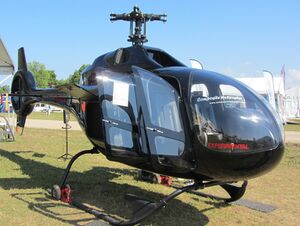Engineering:CHI KC 518 Adventourer
| KC 518 Adventourer | |
|---|---|

| |
| Role | Helicopter |
| National origin | New Zealand |
| Manufacturer | Composite Helicopters International |
| Designer | Peter Maloney |
| First flight | 8 May 2012 |
| Number built | 2 |
The Composite Helicopters International KC 518 Adventourer is a composite fuselage, 5-6 place turbine kit helicopter.[1]
Design
The KC 518 is a composite fuselage helicopter kit for amateur construction. The airframe uses a carbon fiber and kevlar composite fuselage with a shrouded tail rotor. An auxiliary fuel system can be installed.[2]
Variants
Other versions with the same fuselage are KC630 with Rolls-Royce RR300 engine in 2017 (priced at US$970,000), KC640 with the RR250 in 2018, and KC650 with the Honeywell LTS101, expected to be certified by 2019.[3] The rights to the KC630 were acquired by Innova Helicopters in 2017.[4]
Specifications (KC 518 Adventourer)
Data from Manufacturer
General characteristics
- Crew: 1
- Capacity: 5 passengers
- Length: 8.8 m (28 ft 10 in)
- Width: 1.46 m (4 ft 9 in)
- Height: 3.5 m (11 ft 6 in)
- Airfoil: MRB VR7b
- Empty weight: 794 kg (1,750 lb)
- Gross weight: 1,542 kg (3,400 lb)
- Max takeoff weight: 1,542 kg (3,400 lb)
- Powerplant: 1 × Rolls-Royce RR250T63-700 Turboshaft, 240 kW (320 hp)
- Main rotor diameter: × 9.018 m (29 ft 7 in)
Performance
- Cruise speed: 250 km/h (155 mph, 135 kn)
- Never exceed speed: 300 km/h (180 mph, 160 kn)
- Endurance: 3.6hr
- Service ceiling: 4,300 m (14,000 ft)
- Rate of climb: 5.1 m/s (1,000 ft/min)
Test flight crashes
At about 11:15am on 7 May 2013, while on a test flight Pilot Peter Maloney and his female passenger were rescued uninjured after ditching in the Hauraki Gulf, New Zealand.[5]
At about 9:30am on 8 November 2014, while on a test flight Pilot Peter Maloney and his co-pilot, Norbert Idelon were uninjured after a heavy landing near Silverdale, Auckland due to suspected mechanical problems.[6][7]
See also
Aircraft of comparable role, configuration and era
- Vertical Hummingbird
- MD Helicopters MD 500
- Eurocopter EC120 Colibri
- Bell 206
- Robinson R44
- Robinson R66
References
- ↑ "KC 518 Adventourer". http://chweb.businesscatalyst.com/. Retrieved 23 August 2012.
- ↑ "Kitplanes". http://kitplanes2.com/blog/2011/07/the-adventourer-kit-heli-from-composite-helicopter-debuts-at-airventure/. Retrieved 23 August 2012.
- ↑ Head, Elan (April 2015). "Going for certification". Vertical Magazine: p. 41. http://www.verticalmag.com/digital_issue/2015/v14i2/files/45.html. Retrieved 11 April 2015.
- ↑ "Is this the end of the New Zealand helo dream?". 23 February 2017. https://quillorcapture.com/2017/02/23/is-this-the-end-of-the-new-zealand-helo-dream/. Retrieved 25 February 2017.
- ↑ "Rescued helicopter pilot feeling 'really good' after crash". TVNZ. http://tvnz.co.nz/national-news/rescued-helicopter-pilot-feeling-really-good-after-crash-5430502.
- ↑ "Lucky pilot survives his second crash". NZHerald. http://www.nzherald.co.nz/nz/news/article.cfm?c_id=1&objectid=11355587.
- ↑ Composite Helicopters releases accident video, investigation findings archive
External links
 |

